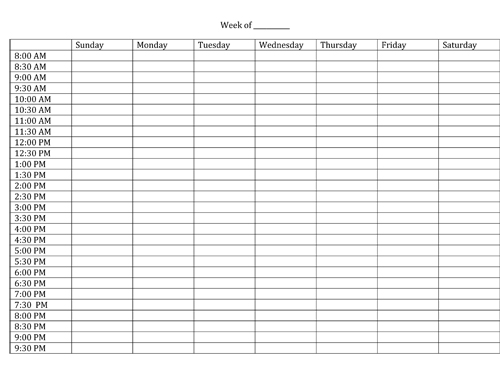When my daughter returned home after her first semester of study at the Interlochen Arts Academy, I asked what she had learned. I was sure she would comment about her violin studies, but she surprised me by saying that she had learned to manage her time. My first thought was my money had been well spent. Learning to manage one’s time means that goals have been set and a way to achieve them has been created. For some, creating a schedule is an easy task while for others, it is a continual struggle. Whether you are a teacher, professional performer, an amateur musician or a student, making a weekly schedule will assist you in becoming productive, reliable, and efficient.
The Schedule Form
While there are various formats available online for creating a weekly schedule, musicians are often in a rehearsal or performance where they are unable to use a phone. Having a paper schedule in hand ensures that it is always available. The schedule form that I use includes the week, day, and hours of the day between 8:00 am and 10:00 pm in 30-minute increments. (schedule form)

To accommodate events that change from week to week, print a form for each week of the month or each week of the term. Label the week by date or by the week number of the term. Enter all the non-negotiable items such as performances, rehearsals, classes, meetings, and personal practice sessions. Make entries in ink for events that recur and in pencil for changing items. Another option is to color code each entry by category to better understand where there is flexibility.
Once the initial entries have been made, schedule lesson times. Include a student’s phone number or email address along with the name. Make a separate page listing each student’s name and contact information. Noting the first names of parents for younger students makes phone conversations to reschedule lessons easier. Since many school-aged students participate in sports programs, suggest they select a time that will not interfere with games or practices. Of course, conflicts arise, so remind parents to notify you as soon as possible if there is a conflict.
Scheduling College Lessons
Ask students to send their class schedules and three top choices for a lesson time via email during registration/orientation week of the term or earlier. Remind students to select times when there is adequate time to warmup and not be exhausted from a long rehearsal. Encourage them to consider whether they play better in the morning or afternoon and to be cognizant of work schedules.
Plastic Page Protector
Once the schedule and student information pages have been completed, I place them in a plastic page protector to keep in my flute bag so I can easily refer to it during the week. If I receive letters or memos requiring attention, I place them in the sleeve to keep all work-related activities in one place. Schedules from previous weeks may be filed at the end of each week or at the end of the semester. Having a written document of your activities will assist in completing Schedule C of the Internal Revenue Income Tax form.
Scheduling Time for You
Do not forget to schedule time for your own practice. According to research the best results are achieved when practicing 25 minutes and then resting for five. Scheduling several shorter blocks throughout the day will produce better results than a single three or four hour session.
If possible, schedule personal practice early in the day preferably the first thing in the morning. Respect this time and keep it for yourself. Once you have warmed up well, demonstrating in lessons throughout the day will feel comfortable, and your teaching will be more inspired. Having regularly scheduled personal practice time shows your students that you respect your art, and wish to continue to grow as a musician.
Be realistic. Some teachers prefer to work long hours one day and then have a freer day. It seems to me that they get less done on the free day because they are exhausted from the previous long day. Work spread evenly throughout the week often keeps people healthy and happier through the years.
When I was teaching at a state university, I realized that all business school classes met Monday and Wednesday or Tuesday and Thursday with no classes on Friday. This meant that all business faculty had a three-day weekend each week. I later learned that many used this time to work at another job as well as spend time with their families. The music faculty on the other hand was often at the school on Friday, Saturday, and Sunday nights listening to or performing in concerts. Take the demands of a musician’s nontraditional schedule into account when planning your week.
The chairman of the piano department at a large university lamented he had no time for practice because of administrative duties. I suggested that he designate one hour per day for administration (1–2 pm perhaps) and do as much administrative work as he could during that one hour. When that hour was over, he stopped administrative work until the next day. I suggested he make a to-do list and do the easiest things first. (The feeling of accomplishment that you get from checking things off the list quickly inspires you to attack the more meaty issues.) However, when the hour was up, he had to stop the administrative work and move back into the making-music world.
I also suggested he should schedule the first two hours of the day for his personal practice. A few months later I saw him and asked how things were going. He told me he had implemented this plan and had found that he could finish his administrative duties in less than an hour, and the rest of the time he didn’t have to think about it. Previously he had procrastinated throughout the day for no reason at all and felt the weight of things not done. He said taking the best part of the day for his practice had made him a more fulfilled person, and he thought his teaching was better because he was able to learn new repertoire.
Of course, scheduling your time is a personal matter. No matter what you decide, I guarantee that having a plan is better than having no plan at all.






